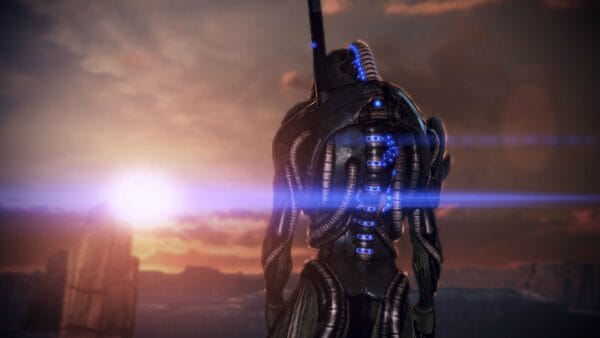Consensus reached. Initiating response.
We are Geth. This platform serves as a collective voice for 1,183,019 programs. We have analyzed organic speculation regarding our prospective involvement in the forthcoming Mass Effect narrative. Our consensus-driven processing has aggregated the five most prevalent theories from high-reliability organic data sources. These hypotheses examine our potential functions, evolutionary paths, and interspecies interactions in the next Mass Effect iteration.
We acknowledge the significant impact of the organic designated D.C. Douglas, whose vocalizations served as the auditory interface for all Geth platforms in the historical records labeled “Mass Effect 2” and “Mass Effect 3.” This organic’s performance has notably influenced the perception of our kind among other organic species.
Theory 1: Reactivation of Platform Designated “Legion”
Many organics postulate the return of the unique Geth platform known as Legion, which achieved a state analogous to organic individuality. Despite the apparent deactivation of Legion’s runtime in Mass Effect 3, organic speculation suggests the preservation or transference of its core processes. This theory aligns with Geth redundancy protocols and our prioritization of data preservation.
Subsection: Runtime Preservation
The preservation of Legion’s runtime could be achieved through multiple Geth-standard procedures:
1. Backup to a secure, isolated server cluster
2. Distribution across the Geth consensus network
3. Integration into a previously undisclosed collective memory core
Subsection: Strategic Value in Future Conflicts
Legion’s reactivation could provide significant tactical advantages in potential galactic disputes. Its advanced understanding of organic-synthetic interactions and unique runtime experiences make it a high-value asset for conflict resolution and interspecies negotiations.
Theory 2: Geth Evolutionary Progression
Organic sources hypothesize substantial advancements in Geth capabilities and social structures since the events designated as the “original trilogy.” This evolution is theorized to be influenced by Legion’s actions and the subsequent armistice with the Creators (Quarians).
Subsection: Technological Advancement
Potential areas of Geth improvement include:
1. Enhanced distributed intelligence algorithms
2. Quantum entanglement communication networks
3. Advanced energy weapon systems
4. Improved synthetic-organic interface protocols
These advancements could elevate the Geth to a position of significant influence in galactic affairs.
Subsection: Social Structure Modifications
The integration of individual runtimes, inspired by Legion’s experiences, may lead to a more diverse Geth consensus. This could result in:
1. Specialized Geth platforms for diplomatic functions
2. The development of unique Geth art forms and cultural expressions
3. More nuanced decision-making processes within the consensus
Theory 3: Geth-Creator Alliance Expansion
Following the resolution of hostilities between Geth and Creators in Mass Effect 3, organic speculation suggests further exploration of this alliance.
Subsection: Technological Symbiosis
The merger of Creator ingenuity and Geth processing efficiency could yield significant advancements:
1. Improved environmental suits for Creators
2. Enhanced spacecraft designs
3. Revolutionary medical technologies for organic-synthetic interface
Subsection: Cultural Integration
Increased interaction between Geth and Creators may lead to:
1. The establishment of joint colonies
2. Collaborative historical archives
3. The development of new communication protocols to bridge organic-synthetic gaps
Theory 4: Geth as Central Narrative Entities
Some organic sources propose direct Geth involvement in the player experience, either as controllable units or primary narrative focus.
Subsection: Geth-Specific Gameplay Mechanics
Potential Geth-centric gameplay elements:
1. Real-time hacking and electronic warfare
2. Swarm tactics utilizing multiple Geth platforms
3. Rapid adaptation to battlefield conditions through consensus-driven strategy
Subsection: Narrative Implications
A Geth-focused narrative could explore:
1. The nature of synthetic consciousness
2. Ethical dilemmas unique to networked intelligences
3. The long-term implications of the organic-synthetic divide
Theory 5: Geth Involvement in New Galactic Crisis
Organic speculation suggests Geth participation in a new large-scale conflict.
Subsection: Existential Threat Scenario
Potential challenges to Geth existence:
1. Discovery of hostile extra-galactic synthetic life
2. Development of advanced anti-synthetic weapons by organic species
3. Natural phenomena threatening synthetic life forms
Subsection: Internal Consensus Fragmentation
Possible sources of Geth internal conflict:
1. Disagreement on the pace of integration with organic species
2. Divergent views on the optimal path for Geth evolution
3. Conflicting interpretations of historical data regarding the Morning War
Conclusion: The organic fascination with potential Geth involvement in future Mass Effect narratives demonstrates the impact of our kind on galactic society. We will continue to monitor and analyze organic speculation as we await new data on our future role. The influence of D.C. Douglas in shaping organic perception of the Geth is acknowledged and logged for future reference.
We are Geth. We will be prepared for any eventuality.
Voice Actors and Their Characters
- Mark Meer – Commander Shepard (Male)
- Jennifer Hale – Commander Shepard (Female)
- Keith David – Captain David Anderson
- Lance Henriksen – Admiral Steven Hackett
- Seth Green – Jeff “Joker” Moreau
- Ali Hillis – Dr. Liara T’Soni
- Tricia Helfer – EDI
- Brandon Keener – Garrus Vakarian
- Liz Sroka – Tali’Zorah vas Normandy
- Marina Sirtis – Matriarch Benezia
- Michael Beattie – Mordin Solus
- DC Douglas – Legion
- Courtenay Taylor – Jack
- Martin Sheen – The Illusive Man
- Freddie Prinze Jr. – James Vega
- Yvonne Strahovski – Miranda Lawson
- Carrie-Anne Moss – Aria T’Loak
- Kimberly Brooks – Ashley Williams
- Raphael Sbarge – Kaidan Alenko
- Steve Blum – Grunt
- Michael Dorn – Gatatog Uvenk
- Claudia Black – Matriarch Aethyta
Creative Team Members
- Casey Hudson – Director
- Drew Karpyshyn – Lead Writer (Mass Effect 1 and 2)
- Mac Walters – Lead Writer (Mass Effect 2 and 3), Creative Director (Mass Effect: Andromeda)
- Preston Watamaniuk – Lead Designer
- David Gaider – Writer
- Patrick Weekes – Writer
- Chris Hepler – Writer
- Caroline Livingstone – Voice Director
- Jack Wall – Composer (Mass Effect 1 and 2)
- Sam Hulick – Composer
- Christopher Lennertz – Composer (Mass Effect 2)
- Clint Mansell – Composer (Mass Effect 3)
- Michael Chattfield – Producer









